Here, you can access the posters presented on the "Towards Sustainable Societies: Health in All Policies and Social Determinants of Health Seminar," held in Tampere, Finland, on September 5 and 6, 2023.
To access the comprehensive two-day programme, please click here.
To access the collection of seminar recordings, please click here.
To access the repository of the seminar PowerPoint presentations, please click here.
Methods for Evaluating Intersectoral Partnerships to Address the Social Determinants of Health: A Scoping Review
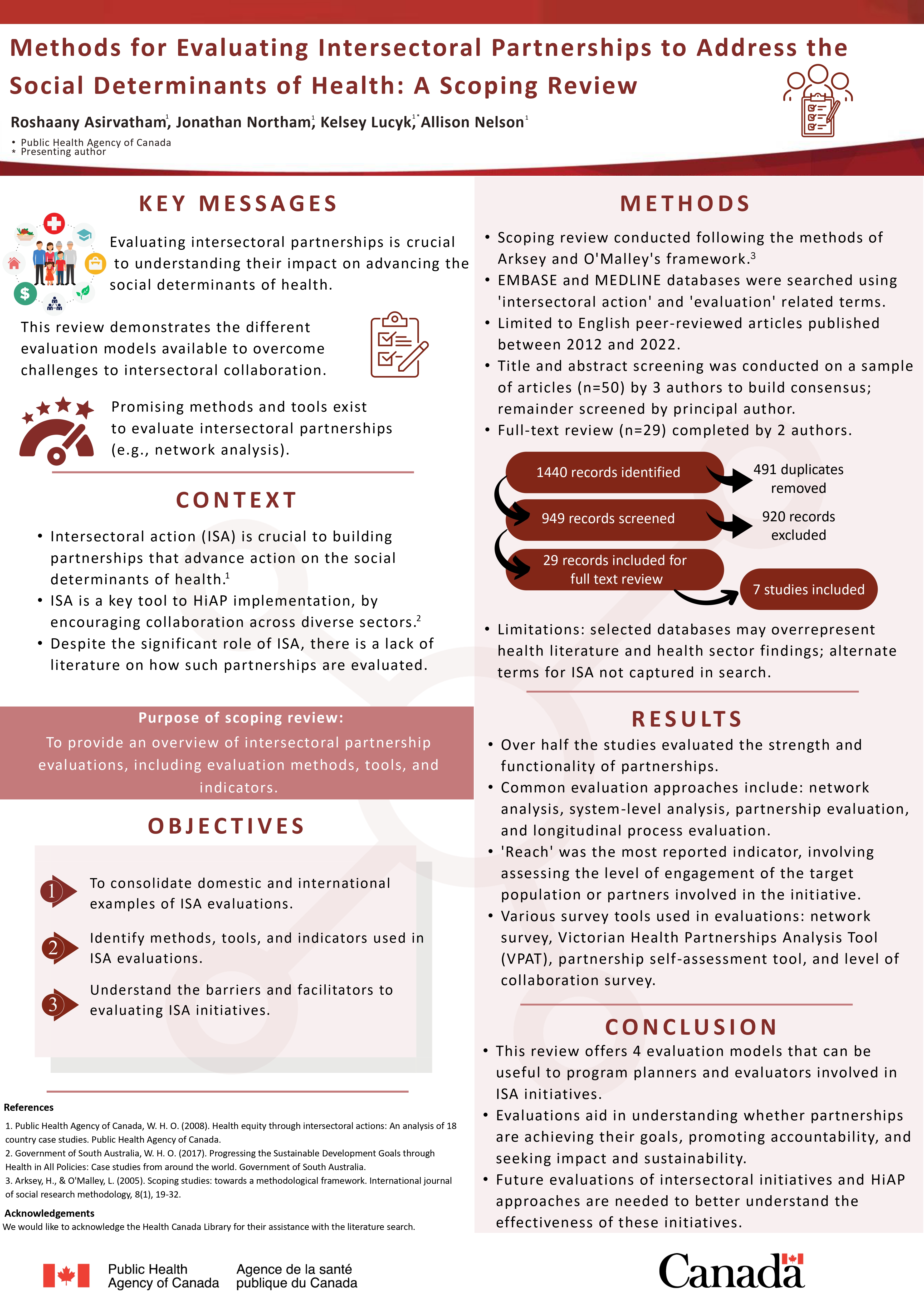
Roshaany Asirvatham, Jonathan Northam, Kelsey Lucyk, Allison Nelson
-Public Health Agency of Canada
Key Messages
- Evaluating intersectoral partnerships is crucial to understanding their impact on advancing the social determinants of health.
- This review demonstrates the different evaluation models available to overcome challenges to intersectoral collaboration.
- Promising methods and tools exist to evaluate intersectoral partnerships (e.g. network analysis)
|
Quality of Life Framework for Canada: A multisectoral approach for well-being
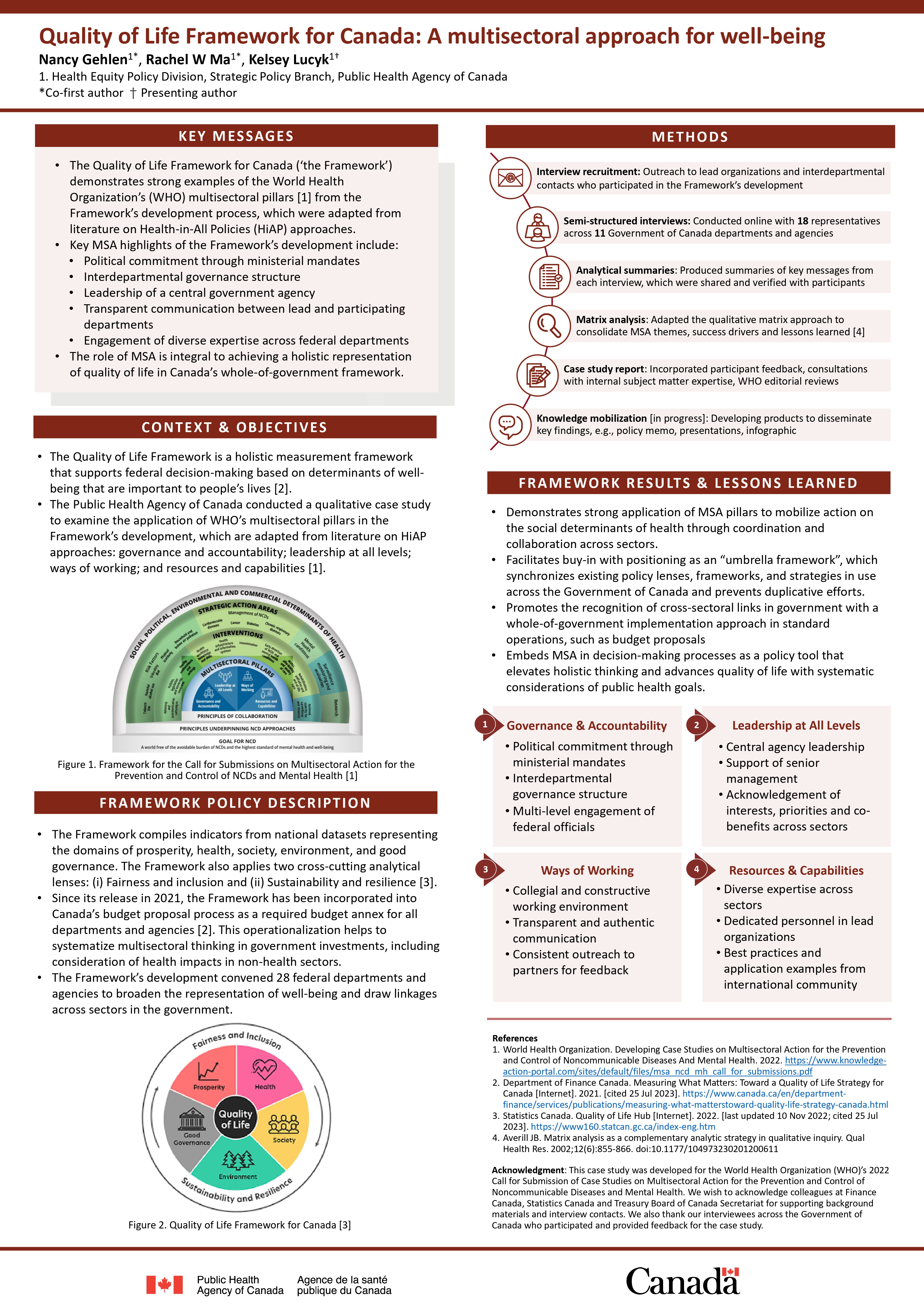
| Nancy Gehlen, Rachel W Ma, Kelsey Lucyk
– Health Equity Policy Division, Strategic Policy Branch, Public Health Agency of Canada |
Key Messages
- The Quality of Life Framework for Canada (‘the Framework’) demonstrates strong examples of the WHO multisectoral pillars from the Framework’s development process, which were adapted from literature on Health-in-All Policies (HiAP) approaches.
- Key MSA highlights of the Framework’s development include:
✓ Interdepartmental governance structure
✓ Leadership of a central government agency
✓ Transparent communication between lead and participating Departments
✓ Engagement of diverse expertise across federal departments
✓ Political commitment through ministerial mandates
- The role of MSA is integral to achieving a holistic representation of quality of life in Canada’s whole-of-government framework.
|
Reinforcing a place-based health approach in local governments
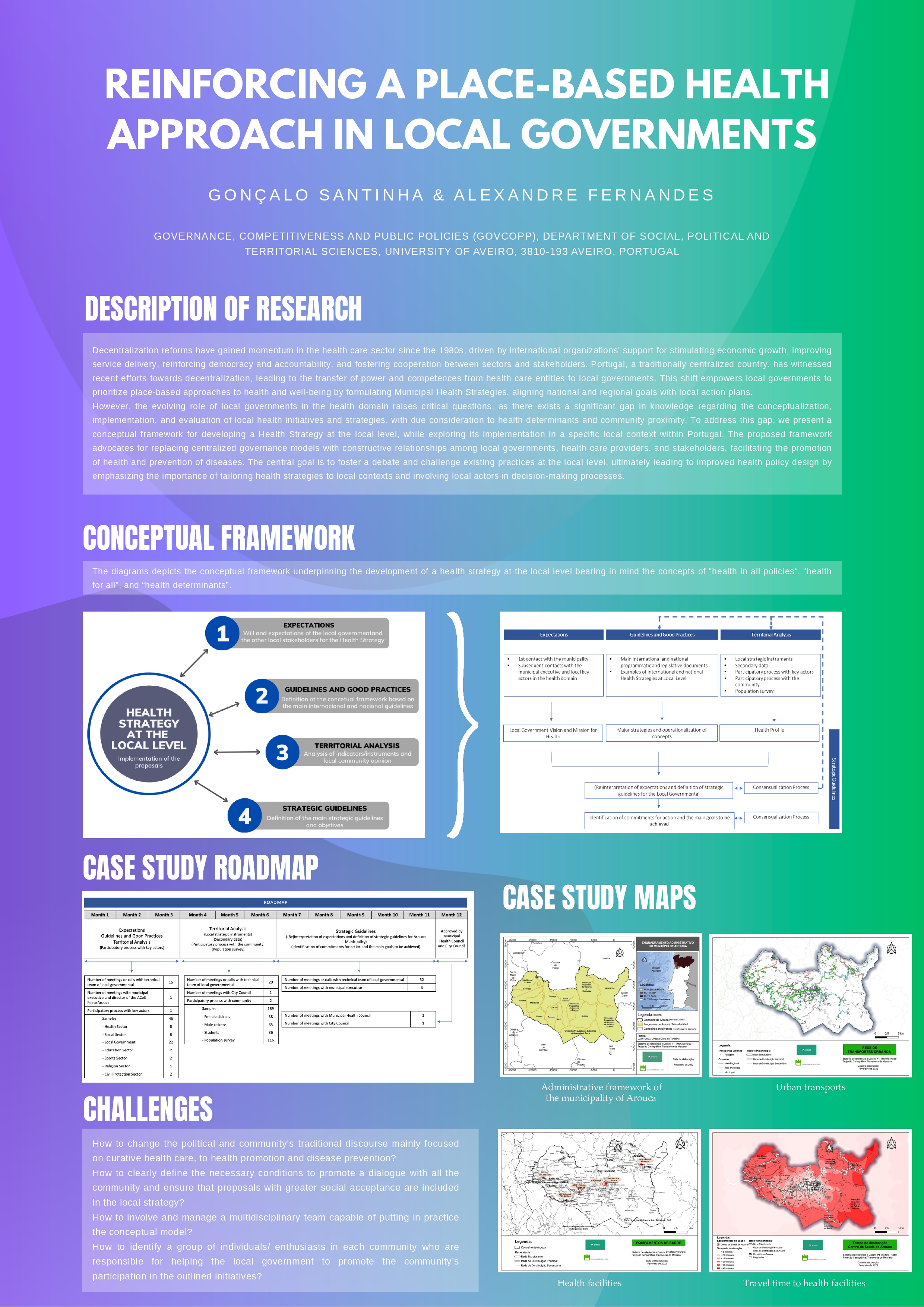
Gonçalo Santinha & Alexandre Fernandes
-Governance, Competitiveness and Public Policies (GOVCOPP), Department of Social, Political and Territorial Sciences, University of Aveiro, Portugal
Key Messages
- Portugal, a traditionally centralized country, has witnessed recent efforts towards decentralization, leading to the transfer of power and competences from health care entities to local governments. This shift empowers local governments to prioritize place-based approaches to health and well-being by formulating Municipal Health Strategies, aligning national and regional goals with local action plans.
- The evolving role of local governments in the health domain raises critical questions as there exists a significant gap in knowledge regarding the conceptualization, implementation, and evaluation of local health initiatives and strategies, with due consideration to health determinants and community proximity.
- To address this gap, the authors present a conceptual framework for developing a Health Strategy at the local level that advocates for replacing centralized governance models with constructive relationships among local governments, health care providers, and stakeholders, facilitating the promotion of health and prevention of diseases.
|
Advancing Women’s Health: Strengthening the HiAP Approach in Portugal
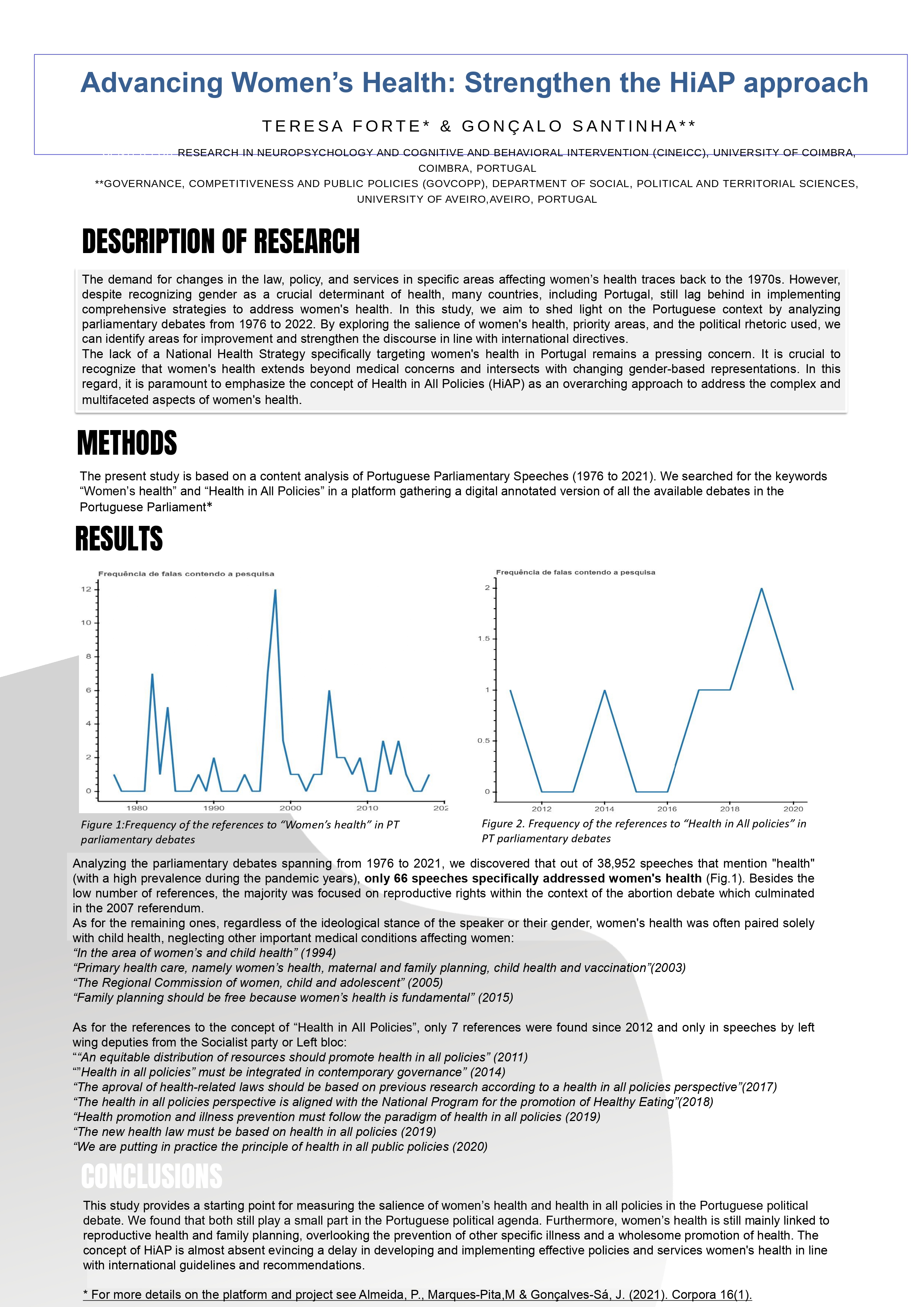
| Teresa Forte1 & Gonçalo Santinha2
1. Center for Research in Neuropsychology and Cognitive and Behavioral Intervention (CINEICC), University of Coimbra, Coimbra, Portugal
2. Governance, Competitiveness and Public Policies (GOVCOPP), Department of Social, Political and Territorial Sciences, University of Aveiro, Portugal |
Key Messages
- In this study, the authors aim to shed light on the Portuguese context by analyzing parliamentary debates from 1976 to 2022. By exploring the salience of women’s health, priority areas, and the political rhetoric used, the authors can identify areas for improvement and strengthen the discourse in line with international directives.
- The lack of a National Health Strategy specifically targeting women’s health in Portugal remains a pressing concern. For the authors, it is crucial to recognize that women’s health extends beyond medical concerns and intersects with changing gender-based representations.
- In this regard, the authors consider that it is paramount to emphasize the concept of Health in All Policies (HiAP) as an overarching approach to address the complex and multifaceted aspects of women’s health.
|
Applying HiAPs Approach to Promote Thailand Healthy Aged Society
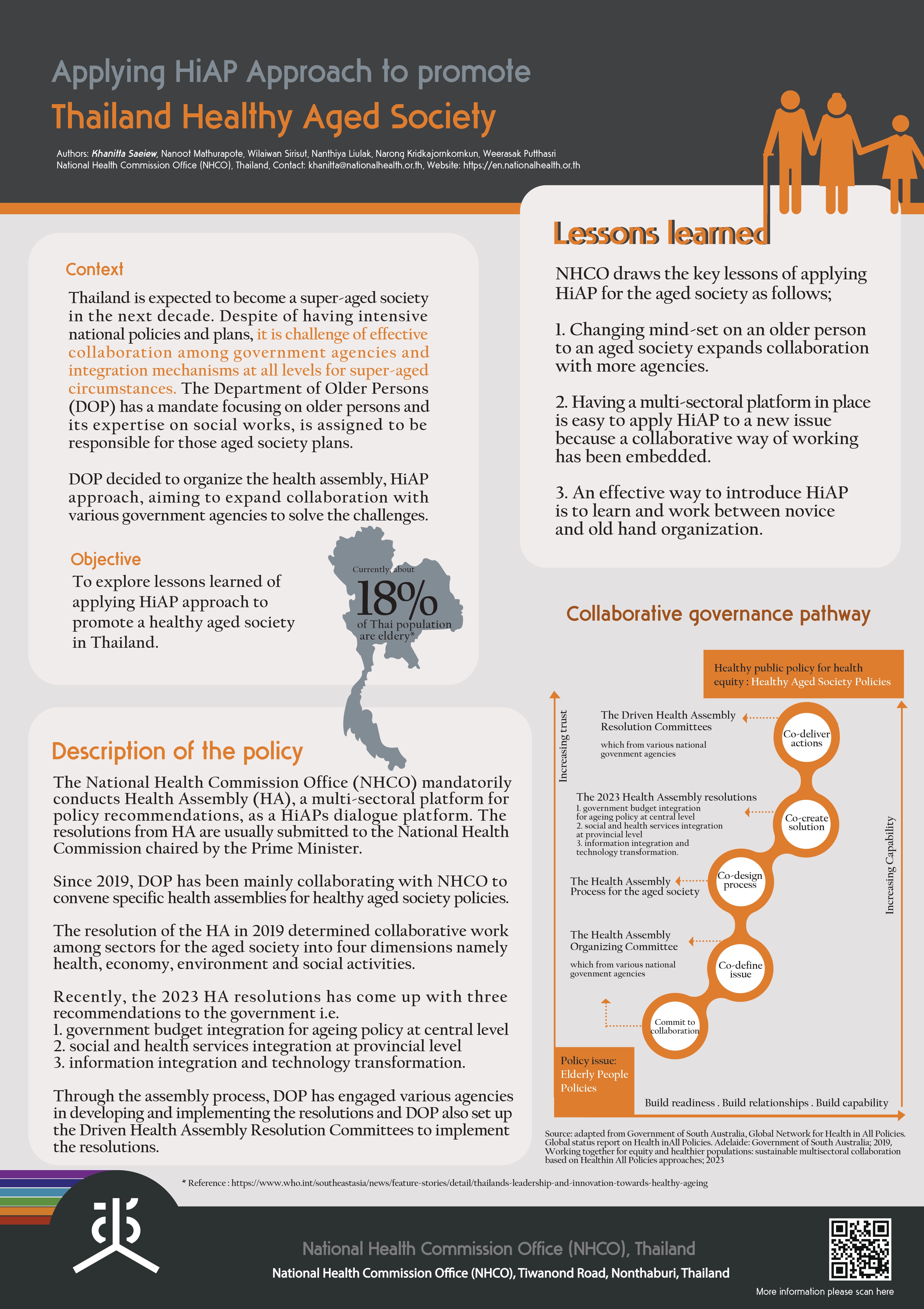
| Khanitta Saeiew, Nanoot Mathurapote, Wilaiwan Sirisut, Nanthiya Liulak, Narong Kridkajornkornku, Weerasak Putthasri
-National Health Commission Office (NHCO) Thailand
Key Messages
- The objective of this poster is to explore lessons learned in applying a HiAP approach to promote a healthy aged society in Thailand.
- The authors draw the following key lessons from this experience:
✓ Changing the mindset from an “old person” to an “aged society” expands collaboration with more agencies.
✓ Having a multi-sectoral platform in place facilitates applying a HiAP approach to a new issue because of embedded collaborative ways of working.
✓ An effective way to introduce HiAP is to learn and work between novice and old hand organization.
|
Exploring Opportunities to Enhance HiAP in Rural Communities in the Context of Disruption
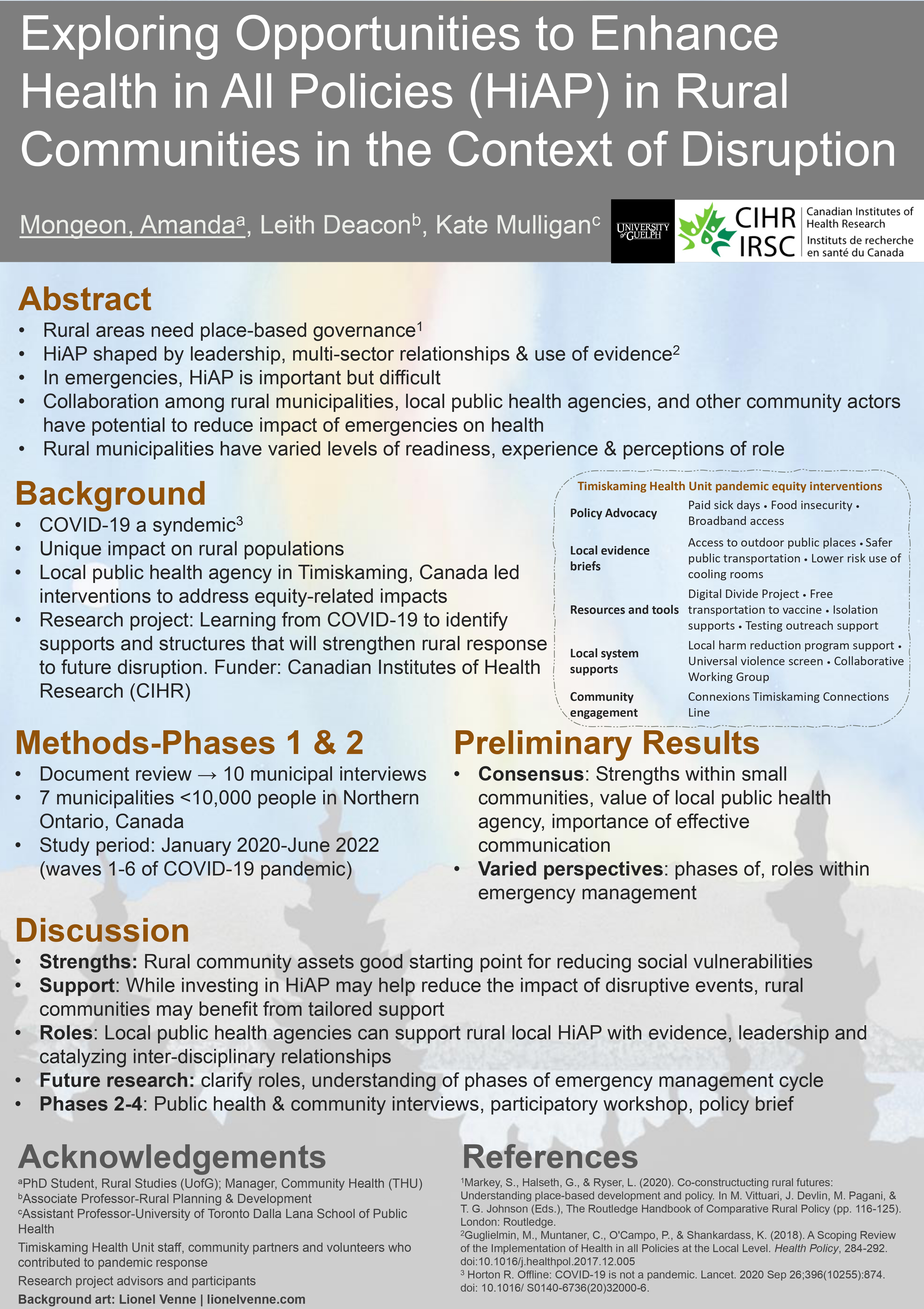
Amanda Mongeon1, Leith Deacon2, Kate Mulligan3
- University of Guelph/Timiskaming Health Unit
- University of Guelph
- University of Toronto Dalla Lana School of Public Health
|
Key Messages
- This poster highlights cross-sectoral interventions and multi-level policy promotion led by a small local public health agency in the rural district of Timiskaming, Ontario, Canada to mitigate health equity impacts of COVID-19. and reduce long-term social vulnerabilities,
- The poster also presents preliminary findings from research exploring structures and supports to help rural governments mitigate the impact of future disruption.
✓ Results from this research indicate that local public health agencies are well positioned to identify policy needs and support cross-sectoral policy readiness, even within an emergency. Investing in HiAP can help reduce social vulnerabilities and therefore the impact of disruptive events however rural community actors have diverse levels of readiness, perceptions about their role in shaping health and experience in doing so.
|
Survey of Homeless People in The City of Tshwane in South Africa
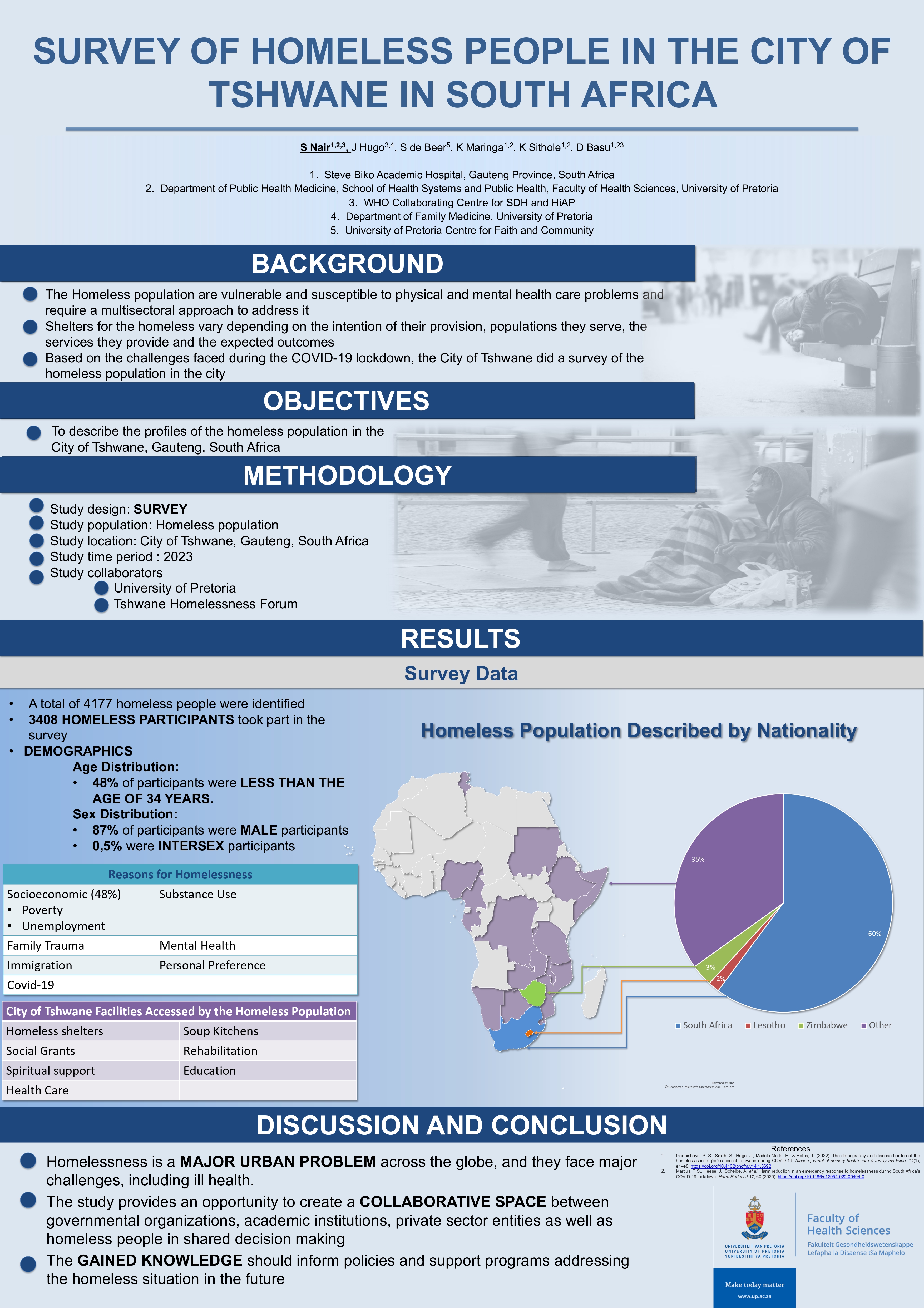
|
Shanal Nair 1, 2, Jannie Hugo 2,3, Stephan de Beer 2, Tsakani K. Maringa 1,2, Khanyisile Sithole 1,2, Debashis Basu 1,2,3
- Steve Biko Academic Hospital, Gauteng Province, South Africa
- University of Pretoria
- WHO Collaborating Centre for SDH and HiAP
|
Key Messages
- Homelessness is a major urban problem across the globe, and homeless people face major challenges, including ill health.
- The study provides an opportunity to create a collaborative space between governmental organizations, academic institutions, private sector entities as well as homeless people in shared decision-making.
- The gained knowledge should inform policies and support programs addressing the homeless situation in the future.
|







